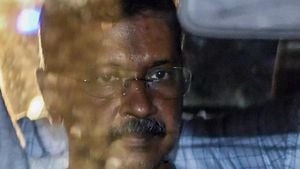Donald Trump's second administration is taking shape as he unveils key appointments aimed at reshaping the federal government with loyalists, following his tumultuous first term marked by internal strife. This time, he seems intent on appointing individuals who share his views and are aligned with his administration's priorities, even if it means challenging confirmation norms.
One of the most notable picks is Pam Bondi, the former Attorney General of Florida, who has been chosen to head the Justice Department. Bondi, who played a significant role during Trump's first impeachment trial, has been vocal about defending Trump against various legal challenges. Her appointment follows the controversial withdrawal of former Congressman Matt Gaetz, who stepped back due to intense scrutiny over allegations involving underage individuals.
Trump’s decision to nominate Bondi has stirred mixed reactions. Critics argue she lacks the independence thought necessary for the role, citing her previous actions—including dropping the investigation of Trump University after receiving campaign contributions from Trump's charity. Pulitzer Prize-winning journalist David Cay Johnston stated, "Donald Trump has just the person he really wants: someone who will be a lapdog when it pertains to wrongdoing by those he likes and seeks to protect, and at the same time, be ready to attack anyone Trump wants revenge against."
Senate Republicans are gearing up for likely confirmation battles over Trump's appointments, with the balance of loyalty and competence at the forefront of discussions. Trump's selections are not just about filling positions; they are strategic moves aimed at tightening his grip on power and aligning the federal bureaucracy with his agenda.
Another notable pick is Scott Bessent for Treasury Secretary. Previously associated with George Soros, Bessent is known for advocating deficit reduction and managing hedge funds. If confirmed, he would make history as the nation's first openly gay Treasury Secretary. His views on cutting government expenditures indicate Trump’s push toward fiscal conservatism, emphasizing his administration’s commitment to reducing the national debt.
Trump has also selected Marco Rubio, the influential Senator from Florida, as his Secretary of State. Rubio, once a rival to Trump, has shifted to become one of his most ardent supporters. His hawkish stance on foreign policy—especially concerning China, Iran, and Cuba—aligns well with Trump's nationalist agenda.
The role of Director of National Intelligence has been offered to Tulsi Gabbard, another individual Trump values for her loyalty rather than extensive national security experience. Gabbard, who has been involved with the military and has openly supported Trump, departs from the traditional profile of such positions, raising eyebrows among political analysts.
On the military front, Trump has tapped Pete Hegseth as Defense Secretary. Hegseth, known for his media presence as co-host of "Fox & Friends Weekend" and his military service, lacks the high-level experience typically expected of someone stepping onto such a pivotal role. Critics question whether he possesses the expertise needed for addressing the myriad global crises facing the United States.
Meanwhile, the administration’s transition is faltering around the edges due to the absence of standard procedural checks and background checks traditionally employed before confirmations. This hurried pace and lack of oversight have drawn scrutiny, particularly from political commentators who recall the lessons learned from past transitions.
"This loss of time hampers the new administration's ability to effectively manage pressing national security issues and potential conflicts of interest," noted Senator Elizabeth Warren, calling attention to these procedural slip-ups. The Trump transition has been characterized by rapid announcements of appointments without the customary vetting processes, raising concerns about potential conflicts and lack of preparedness.
Despite these challenges, Trump appears undeterred. The selection of individuals like Lori Chavez-DeRemer for Labor Secretary reflects his strategy to appeal to working-class voters, especially with her support for labor rights measures. Having received backing from union members previously, her appointment could potentially reshape labor policies under the new administration.
Looking forward, Trump's pivot toward surrounding himself with staunch allies marks a notable change from his first term, where disputes and factionalism often hindered his agenda. With the Senate majority still held by Republicans, the administration hopes to navigate the rocky confirmation processes and leverage its political capital effectively.
This calculated approach is seen as both opportunistic and indicative of Trump’s enduring influence within Republican circles. By drawing on his loyal supporters for these key positions, Trump aims to solidify his authority and set forth his administration's priorities without the constraints faced previously.
Whether these appointments will lead to successful governance or merely exacerbated partisan divides remains to be seen, but one thing is clear—Trump is gearing up for what could be one of the most contentious administrations yet.



